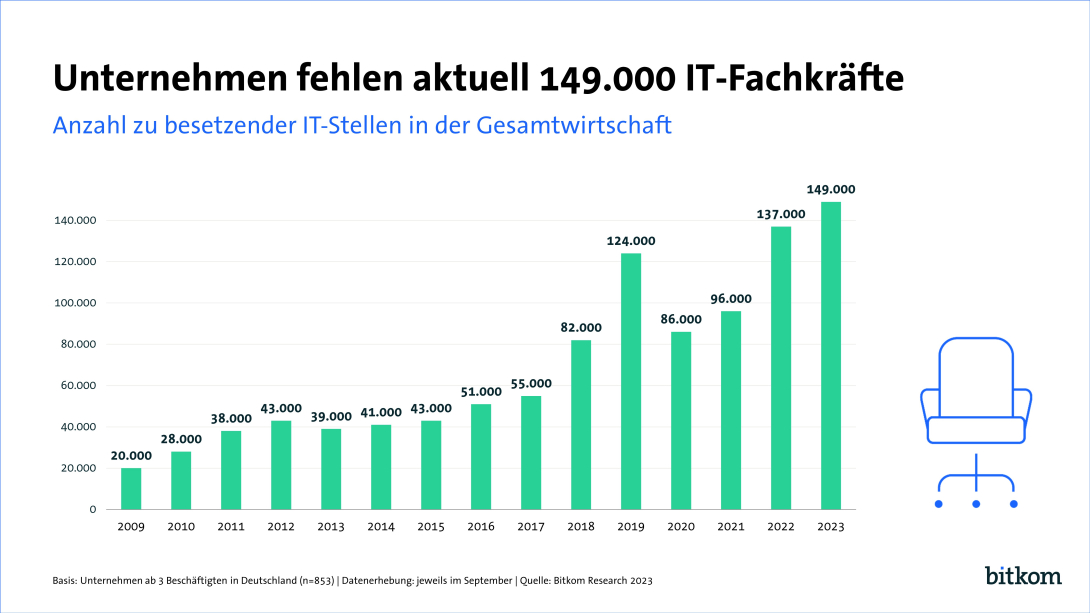In the ever-evolving landscape of Germany’s labor market, the shortage of skilled IT professionals has reached new levels, reaching 149,000 open positions in 2023.
Recognizing this challenge, the Skilled Immigration Act was implemented in Germany in 2020, aiming to attract talented professionals. However, despite this initiative, a significant number of companies, accounting for 67 percent, report facing a very high level of bureaucratic effort related to the act.

As evident from the graphic above, the shortage of skilled workers has persistently increased since 2020, indicating that more comprehensive solutions are urgently required.
Confronting this challenge, a notable 50 percent of companies believe that Artificial Intelligence (AI) can be a pivotal tool in mitigating the skills shortage. Simultaneously, some companies are investing in internal training programs. Yet, the time needed for these initiatives presents a significant challenge, underscoring the need for new prompt approaches.
Challenges and Time-to-Hire Concerns
The increasing shortage of skilled workers has also stretched the time-to-hire to 7.7 months. This not only reduces operational efficiency but also increases the cost of vacancy (COV). The COV encompasses the financial losses while a position remains unfilled, including lost productivity, recruitment costs, and potential revenue.
Amidst this challenging scenario, an opportunity emerges with the growing pool of freelancers. As the shortage intensifies, freelancers offer a flexible and immediate solution, presenting a possibility to bridge the skills gap and reduce COV.
Opportunities Presented by Freelancers
While AI offers promising solutions, it’s essential to recognize the irreplaceable value of skilled human professionals in conjunction with technological advancements. Freelancers can play a significant role in AI integration, bringing diverse perspectives and technical know-how to accelerate implementation and optimization processes.
Additionally, Internal training programs play a crucial role in nurturing talent for long-term organizational growth and stability. By incorporating freelancers into the company’s skills ecosystem, it becomes feasible to complement these internal training initiatives, introducing fresh expertise and thereby enhancing overall skill development within the organization.
Consequently, freelancers offer a flexible and immediate solution to support both AI integration and internal training programs, aiding in the rapid closure of skill gaps and enabling your organization to adapt to evolving industry demands effectively.
Helping Volkswagen Group Brands to Contract Freelancers
As the exclusive tech recruiting company for Volkswagen, at Futurepath, we specialize in connecting hiring managers with top-tier freelancers in a matter of days. If you’re new to working with freelancers, here are answers to some of the most frequently asked questions from our clients:
A: Our service operates on a trust-based model, ensuring no upfront costs (payment only upon successful placement) and offering the flexibility to cancel your contract at any time.
A: We guarantee the quality of our candidates by utilizing the knowledge of our recruiters in the technology and automotive sectors, along with our pre-screened talent pool, to reduce risks. Furthermore, our efficient IT onboarding procedure enables quick integration of freelancers into your projects.
A: Our team of recruiters not only possesses extensive knowledge in both the automotive and tech industries but also has in-depth experience navigating the complexities of hiring within the VW Group, ensuring that we not only meet but exceed the expectations of our clients.
A: We manage all facets of paperwork, from contracts to invoices, ensuring a seamless process for freelance contracting, allowing you to focus on your core priorities.
Push start on
your Futurepath!
Are you ready to explore the advantages of working with freelancers and revolutionize your approach to talent acquisition? Reach out to us today. Let us be your partner in navigating the talent shortage effectively and efficiently.



